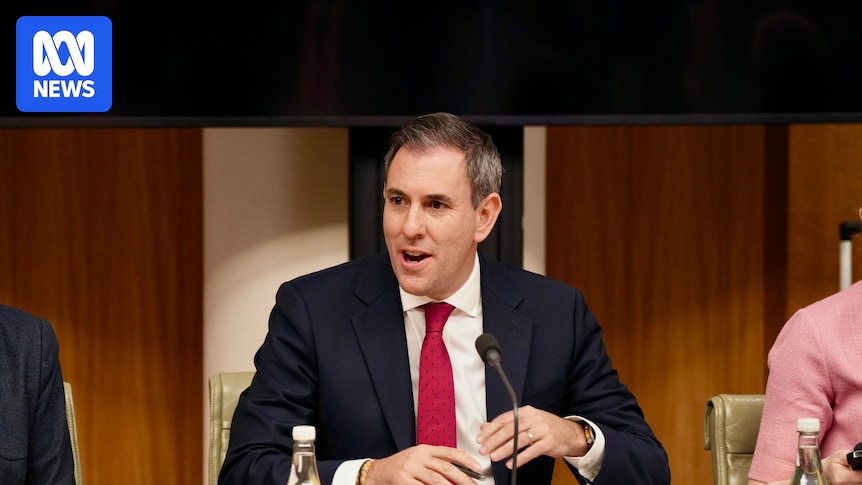It was only last week the prime minister stood in front of three grieving parents to announce YouTube would be included in his social media ban for kids. One father was cradling an urn as he blamed social media for the loss of his daughter.
It was a powerful example of a government, with bipartisan support, scrambling to catch up after the horse bolted on a new technology.
Another was the News Media Bargaining Code, introduced by the Morrison government to force Google and Facebook to cough up for news content driving clicks on their sites.
Leaving aside arguments about the effectiveness of both moves, they represent attempts at retrofitting regulation to put the social media genie at least partly back in the bottle.
Which brings us to the current debate around how to regulate — or not — artificial intelligence.
Loading…Economics reform roundtable looms
If the treasurer’s reform roundtable kicking off in two weeks achieves nothing else, it has at least sharpened a long overdue debate about what role government should play in setting the rules of the road for AI.
This technology is already upon us. AI is involved whenever we use search engines, digital assistants (think Siri or Alexa), streaming services (think Netflix), and social media. Banks, big tech, and cyber security firms are all racing to roll it out.
Even the care sector is quickly developing ways to harness the opportunities.
Productivity Commission warns against tough AI laws
The Brotherhood of St. Laurence, a social justice organisation that provides aged care, disability and other community services, recently ran an eight-week trial of an AI tool.
The results were overwhelmingly positive. Staff involved found AI saved them about an hour a day, which could then be spent focusing more on teams and participants. The technology also improved accessibility for staff with language barriers or neurodiversity.
“AI has great potential to help community organisations work smarter, reach more people, and tackle long standing barriers to access and equity — if it’s done right”, Executive Director Travers McLeod told the ABC. “Used responsibly, AI can free up human time in a way that can generate impact for the communities in which we work and support.”
The benefits are clear, but McLeod also notes the importance of “strong ethical guardrails and a clear framework for lawful and ethical AI use, along with its environment impact, especially in the care economy”.
“AI must be used as an accelerant of equity and better outcomes for all, not in a way that grows inequity and poverty,” he said.
This is where the role of the government comes in.
Treasurer Jim Chalmers is optimistic the benefits of AI will ultimately outweigh the risks. (ABC News: Ian Cutmore)
Unions and business groups weigh in
Some of these AI “guardrails” already exist in the care sector. Some exist in other sectors too. There’s a federal Privacy Act, some states have a Human Rights Act, some industries have professional guidelines.
There is, however, no single set of rules for the entire economy governing the “ethical” use of AI or how it can be used to replace human workers.
This is the debate now raging ahead of the treasurer’s roundtable.
At one end of the spectrum sits the ACTU, which wants a national artificial intelligence act, and a new national AI authority to oversee “mandatory enforceable agreements” in every workplace, to ensure staff are consulted before technology is rolled out.
At the other end of the spectrum, business groups and the Productivity Commission want as little additional regulation as possible. They argue existing rules are enough and don’t want to slow down a technology viewed as crucial for Australia’s future success.
Loading…A ‘sensible middle path’
Treasurer Jim Chalmers is pitching himself as something of a Goldilocks on this. He says he wants to find the right balance “between over-regulating and under-regulating”.
This “sensible middle path”, as Chalmers calls it, charts a course on AI regulation between those who want to “let it rip” and those who want to “pull the doona over the head”.
This sounds perfectly reasonable, but notably, it still represents a rejection of the union movement’s position. Before this roundtable has even begun, the treasurer has said no to one of the ACTU’s biggest demands.
Indeed, the treasurer is openly siding with the Productivity Commission on this. “The PC’s broad directions are largely consistent with the directions that I set out on the weekend.” That is, that AI should be treated “as an enabler, not an enemy.”
Artificial Intelligence might just be the answer to productivity concerns
This fundamental difference between the union movement and the Labor government over AI could become a bigger point of friction beyond this month’s roundtable, given we’re only at the start of the AI transformation.
AI will increasingly change the way we live and work. There are bound to be jobs lost. Hopefully, new roles will also be created. Where this transformation leads to is difficult to predict, but the path is unlikely to be smooth.
Having put its stake in the ground, the ACTU will now be there whenever jobs are lost, demanding much tougher AI rules than the government is willing to accept.
The government is trying to strike the right balance between preventing mass redundancies forced by AI, while also preventing Australia falling behind those countries rapidly embracing the technology.
Chalmers is optimistic the benefits will ultimately outweigh the risks. He won’t want to be a prime minister 10 years from now trying to retrofit regulation after the AI horse has bolted.
David Speers is national political lead and host of Insiders, which airs on ABC TV at 9am on Sunday or on iview.
Loading

